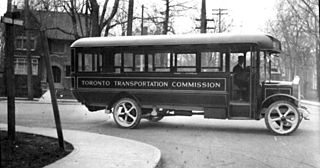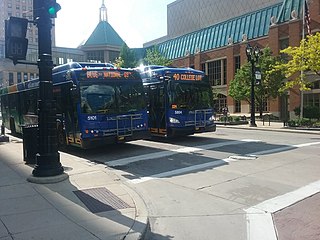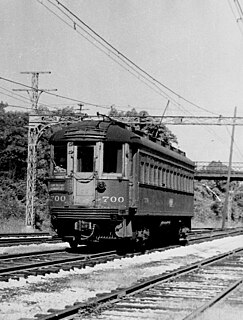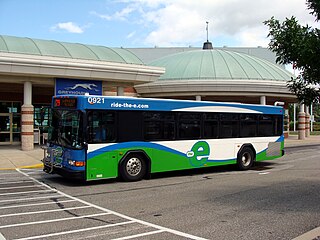History
Urban public transit service has been available in the City of Kenosha since February 3, 1903, when streetcar operations commenced over the Kenosha Electric Railway using two Birney cars, later supplemented by motor buses. There were several owners of the system over the decades. On February 14, 1932, the service was supplanted by a system of twenty-two electric trolley-buses, also called trackless trolleys; 10 St. Louis Car Company coaches (Job 1555); and 12 Yellow Coach Model MTA 701 coaches. At that point, the Wisconsin Gas & Electric Company, the operators at the time, pioneered a color-coded route designation system, which is believed to be the first in the world.
Ford V8 gasoline transit buses were introduced to supplement increased wartime-production service during World War II.
On September 5, 1942 the system came under the ownership of Kenosha Motor Coach Lines (KMCL) (later Kenosha Motor Coach Company), which had been incorporated on June 27, 1942. By 1948, KMCL began purchasing new diesel coaches, which finally supplanted all trolley-bus operations in March 1952.
The president of Kenosha Motor Coach Lines was Henry P. Bruner (November 16, 1900 - November 30, 1993). Bruner had been a transportation consultant in Indiana, and with personal assets of approximately $16,000 managed to acquire southeastern Wisconsin transit properties valued at $1,242,000. He acquired the Racine city system in 1939 from The Milwaukee Electric Railway and Transport, known as Racine Motor Coach Lines.
On December 27, 1943 KMCL under Bruner purchased the ten and one-half mile Kenosha-Racine segment of the Milwaukee-Racine-Kenosha rapid transit trackage from Milwaukee's Transport Company for $100,000, with a down payment of $22,500 and an annual payment of $7,750 plus an annual right-of-way rental of $6,500. (The book value of the line was $952,388.)
On September 27, 1944 KMCL, with a $75,000 down-payment, an annual payment of $5,000 and a yearly land rental of $5,000, acquired for $300,000 the remaining Racine-Milwaukee line of 24 miles, which included in its appraised book value of $1,720,214 Transport Company cars 1111, 1113, 1118 and 1120, and duplex trains 1180–1181, 1182–1183, 1184-1185 plus line-car D-23. The Transport Company furthermore had guaranteed KMCL a salvage value of $181,000 - $73,000 for the Kenosha-Racine segment and $158,000 for the Racine-Milwaukee portion.
These dealings brought about a $1 million stockholder lawsuit against KMCL and the Transport Company, which charged its officers and directors with profiteering by underbidding the purchases. The court denied the affirmations, a decision later upheld after appeal to the Wisconsin Supreme Court.
On July 18, 1945 the Shore Line Transit Corporation of Indiana quietly purchased all of the outstanding KMCL stock.
On September 27, 1945 another interurban segment, the 28-mile Milwaukee-Port Washington line, was sold to KMCL for $142,000 (a $37,500 down payment, a $2,000 annual payment and a $3,900 annual land rental.) More rolling stock was included: cars 1139, 1140 and 1141, plus duplex trains 1186–1187, 1196–1197 and 1198-1199 plus line-car D-3 (ex D-23), M-1, 202, F250, F251 and F252, and section cars 40638 and 44037.
In December 1946, KMCL bought the 23-mile Milwaukee-Waukesha-Hales Corners rapid transit line for $325,000 ($37,500 down and $7,500 a year plus annual land rental of $18,600), with an additional agreement to pay trackage rights to the Transport Company for operations over Milwaukee streets. In this transaction, all the remaining Transport Company rolling stock was tendered to KMCL. (The Transport Company retained all real-estate ownership plus operating rights over the Milwaukee-West Junction trackage.) Throughout all these purchases by KMCL, the operational crews remained employees of the original company.
Following these dealings the Transport Company was able to realize tax deductions of $3,432,676 on the sales of its interurban lines. Bruner's total risk was $169,000.
Bruner told the Milwaukee Journal on May 22, 1947 that KMCL "would like to abandon passenger service as soon as possible." His petition to abandon the Kenosha-Milwaukee rapid transit line was granted in stages. The last Kenosha-to-Racine train left at 12:55 a.m. on September 13, 1947 (with Frank Hemmingsten as motorman and Carl Hansen, conductor) and service on the Racine-Milwaukee line ended when the last train left Racine at 10:15 p.m. on December 31, 1947. (Quin Valdes was the last motorman, and Emil Nichol the conductor.) The next day, all replacement bus service by Bruner's subsidiary company Milwaukee & Lake Shore Line was canceled following a 10.8-inch snowfall. The bus line was not a success and was given up within one year.
However, repeated attempts to abandon the Milwaukee-Waukesha-Hales Corner lines were denied, and Northland Greyhound acquired all KMCL stock on August 27, 1948. Northland Greyhound's initially stated intent to continue service but soon claimed losses of $20,000 per month and intent to abandon. (That line would instead be resold to become The Milwaukee Rapid Transit & Speedrail Company.)
The onset of increasing postwar automobile ownership led to continuing declines in bus service hours and profits. In the early 1960s the system - now Kenosha Motor Coach Company - was sold to Lakeshore Transit-Interurban and, in mid-1969, to longtime local school-service transit provider Pathfinder Lines, which finally ceased local transit service in February 1971. A successful citywide referendum then permitted the city of Kenosha to acquire and operate public transit service. City-operated transit service commenced with five routes in September 1971 with four gasoline-engined and one diesel-engined Twin Coach busses, supplanted by several used GMC diesel coaches purchased from Milwaukee and Janesville, Wisconsin (the latter gasoline-powered). The color-coded route designations were supplanted by a route-numbering system. By April 1975, 24 new GMC coaches (designated the 500 series) were introduced into service. By 1980 several new GMC Rapid Transit Series (RTS) coaches were added to the growing fleet. By the 21st century the active KAT bus fleet included buses built by Orion Bus Industries, Gillig (including several Gillig Phantoms), Nova Bus and Flxible. Today's fleet consists of Gillig and New Flyer buses.

Kenosha is a city in and the county seat of Kenosha County, Wisconsin, United States. Kenosha is on the southwestern shore of Lake Michigan. With an estimated population of 100,164 as of July 1, 2018, it is the fourth-largest city in Wisconsin and the fourth-largest city on Lake Michigan. Although closer to Milwaukee, the city is a part of the United States Census Bureau's Chicago Combined Statistical Area (CSA); due to its metropolitan area being larger.
The notion of a General Motors streetcar conspiracy emerged after General Motors (GM) and other companies were convicted of monopolizing the sale of buses and supplies to National City Lines (NCL) and its subsidiaries. In the same case, the defendants were accused of conspiring to own or control transit systems, in violation of Section 1 of the Sherman Antitrust act. The suit created lingering suspicions that the defendants had in fact plotted to dismantle streetcar systems in many cities in the United States as an attempt to monopolize surface transportation.

The Minnesota Transportation Museum is a transportation museum in Saint Paul, Minnesota, United States.

Toronto Transportation Commission (TTC) was the public transit operator in Toronto, Ontario, Canada, which operated buses, streetcars and the island ferries. The system was renamed to the Toronto Transit Commission (TTC) in 1954.

The San Diego Electric Railway (SDERy) was a mass transit system in Southern California, United States, using 600 volt DC streetcars and buses.

The Union Pacific / North Line (UP-N) is a Metra line in the Chicago metropolitan area. It runs between Ogilvie Transportation Center and Kenosha, Wisconsin. Although Metra owns the rolling stock, the trains are operated and dispatched by the Union Pacific Railroad. This line was previously operated by the Chicago & North Western Railway before its merger with Union Pacific, and was called the Chicago and North Western Milwaukee Division and then the Chicago & North Western/North Line before the C&NW was absorbed by Union Pacific in April, 1995.

The Milwaukee County Transit System (MCTS) is the largest transit agency in Wisconsin, and is the primary transit provider for Milwaukee County. It ranks among the top 50 transit agencies in the United States for total passenger trips. The Milwaukee Transport Services, Inc. is a quasi-governmental agency responsible for the management and operation of the Milwaukee County Transit System. The county-run agency was formed in 1975 after taking over the assets of the Milwaukee & Suburban Transport Company, a private operator.

The Chicago North Shore and Milwaukee Railroad, also known as the North Shore Line, was an interurban that operated between the Chicago Loop and downtown Milwaukee. The 85-mile route of the North Shore Line utilized a combination of private rights-of-way and street running as well as trackage rights over the Chicago "L" network. In addition to operating passenger and freight trains, the company also provided streetcar and motor bus services throughout its history.

Wisconsin Coach Lines is a commuter bus service, charter coach service and intercity carrier based in Waukesha, Wisconsin. WCL was founded in 1941 as Waukesha Transit Lines. It has been a subsidiary of Coach USA since 1998.

The Chicago Surface Lines (CSL) was operator of the street railway system of Chicago, Illinois, from the years 1913 to 1947. The firm is a predecessor of today's publicly owned operator, the Chicago Transit Authority.

Streetcars were part of the public transit service in Kenosha, Wisconsin, in the first third of the 20th century and returned to this role in 2000.

Johnstown Traction Company (JTC) was a public transit system in Johnstown, Pennsylvania, United States. For most of its existence it was primarily a street-railway system, but in later years also operated rubber-tired vehicles. JTC operated trolley (tram) service in Johnstown from February 23, 1910 to June 11, 1960. Johnstown was one of the last small cities to abandon trolley service in the United States. It was also the smallest city to acquire a fleet of PCC cars and acquired trackless trolleys at a late date compared to larger transit properties. Many of the 1920s-era cars went directly to museums; however, none of the 17 PCC streetcars were saved. Efforts to sell the 16 then-surviving PCC cars intact were unsuccessful, and in 1962 they were scrapped, but many of their components were salvaged and sold to the Brussels, Belgium tram system, reused in the last series of single PCC trams (7156–7171), which ran from 1970 until February 2010.

The Louisville Railway Company (LRC) was a streetcar and interurban rail operator in Louisville, Kentucky. It began under the name Louisville City Railway in 1859 as a horsecar operator and slowly acquired other rival companies. It was renamed in 1880 following the merger of all Mule operations as the Louisville Railway Company. All tracks were 5 ft gauge.

The Erie Metropolitan Transit Authority (EMTA) is the Municipal Authority that owns and operates the public transport system in Erie County, Pennsylvania which includes the 'e', the area's transit buses; LIFT, the county paratransit service; and Bayliner Trolley, the downtown circulator.

The Milwaukee Electric Railway and Light Company, also referred to as the Milwaukee Interurban Lines or TMER&L, is a defunct railroad that operated in and around Milwaukee, Wisconsin. It was the largest electric railway and electric utility system in Wisconsin, and combined several of the earlier horsecar, steam dummy, and streetcar lines into one system. Its Milwaukee streetcar lines soon ran on most major streets and served most areas of the city. The interurban lines reached throughout southeastern Wisconsin. TMER&L also operated the streetcar lines in Appleton, Kenosha, and Racine, as well as its own switching operations at the Port Washington and Lakeside power plants.

The San Diego Metropolitan Transit System is the public transit service provider for Central, South, Northeast and Southeast San Diego County, in the United States. MTS operating subsidiaries include the San Diego Trolley, Incorporated (SDTI), and San Diego Transit Corporation (SDTC). Average daily ridership among all public transit services provided by MTS was 271,500 in the Fourth Quarter of 2017.

Streetcars or trolley(car)s were once the chief mode of public transit in hundreds of North American cities and towns. Most of the original urban streetcar systems were either dismantled in the mid-20th century or converted to other modes of operation, such as light rail. Today, only Toronto still operates a streetcar network essentially unchanged in layout and mode of operation.

Kenosha is a railroad station in Kenosha, Wisconsin, United States, served by Metra's Union Pacific/North Line. It is the northern terminus of the line, which runs south to the Ogilvie Transportation Center in Chicago, Illinois. Kenosha is the only Metra station outside of Illinois, as far as 51.6 miles (83.0 km) from Ogilvie Transportation Center. Because it is located outside the RTA’s jurisdiction, the service to the station is partially subsidized by the city of Kenosha. It is the northernmost station of the entire Metra system, making it the most northern station in the entire RTA network. Other commuter services extended from Chicago into Wisconsin but were eventually discontinued. The KD Line ran from Kenosha to Harvard and closed in 1939. The Northwest Line had a branch to Williams Bay that was cut back to Lake Geneva in 1966 and discontinued north of the state line in 1975. The Milwaukee Road had commuter service to Walworth until 1982 when Fox Lake became the present northern terminal.

Public transport bus services are generally based on regular operation of transit buses along a route calling at agreed bus stops according to a published public transport timetable.

















